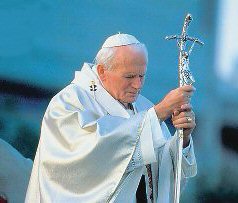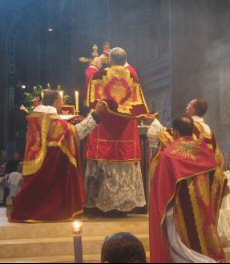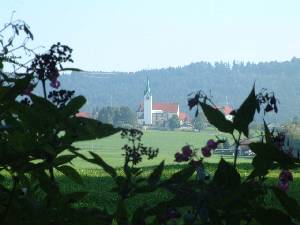1) What exactly is Juventutem ?
• Juventutem is an international delegation of traditional youth to the XXth World Youth Day in Cologne 2005 (10th-15th/15th-21st August 2005). That delegation is named "Juventutem" (www.juventutem.com), as a quote from the prayers at the foot of the altar in our 1962 Missal : "Introibo ad altare Dei, ad Deum Qui laetificat juventutem meam". Nowadays there is a cult of the youth as if it were a value in itself. This is good neither for the youth, nor for society in general. That is why we have chosen a name which refers to the only genuine youth that there is, the one dependent not on number of years or cosmetic manipulation, but rather that spiritual youth which follows on the humble and confident familiarity with Divine Grace.
• Still, we know that the hundreds of thousands of pilgrims expected to rally to Cologne, Germany, between 15th and 21st August 2005 will not be older than 30 years of age. It is no secret that few among them are acquainted with the “1962 Missal”. On the other hand, traditional souls do not ignore the abuses which often occur in such huge gatherings, regarding the way people dress or behave, or even regarding the way Holy Communion is distributed. For these reasons, there has never been any official traditional delegation to the World Youth Day so far. God willing, that is however going to change.
2) Are the Ecclesia Dei communities supporting Juventutem?
 • Let us have a quick look first at the Ecclesia Dei movement. Next summer, it will be the 17th year after Pope John Paul II’s motu proprio Ecclesia Dei. By now the Ecclesia Dei movement comprises one bishop (Bishop Rifan of Campos), several hundred priests and religious with various apostolates and Mass centres on almost all continents, with thousands of deserving individuals and families supporting these vocations, together with a number of solid traditional newspapers, magazines, and publishing houses. The Fraternity of St Peter alone numbers 300 members, including 180 priests and 120 seminarians. The Institute of Christ the King is also growing steadily, not to mention the religious communities like the Fraternity of St Vincent Ferrer (with the traditional Dominican rite and spirituality), the Regular Canons of the Mother of God, or Benedictine monasteries like Le Barroux, Fontgombault, Clear Creek (USA), etc. All work in conformity with Pope John Paul II’s intention as expressed again on September 21, 2001 in his address to the plenary assembly of the Congregation for Divine Worship and the Discipline of the Sacraments : “In the Roman Missal of Saint Pius V, as in several Eastern liturgies, there are very beautiful prayers through which the priest expresses the most profound sense of humility and reverence before the Sacred Mysteries: they reveal the very substance of the Liturgy”. • Let us have a quick look first at the Ecclesia Dei movement. Next summer, it will be the 17th year after Pope John Paul II’s motu proprio Ecclesia Dei. By now the Ecclesia Dei movement comprises one bishop (Bishop Rifan of Campos), several hundred priests and religious with various apostolates and Mass centres on almost all continents, with thousands of deserving individuals and families supporting these vocations, together with a number of solid traditional newspapers, magazines, and publishing houses. The Fraternity of St Peter alone numbers 300 members, including 180 priests and 120 seminarians. The Institute of Christ the King is also growing steadily, not to mention the religious communities like the Fraternity of St Vincent Ferrer (with the traditional Dominican rite and spirituality), the Regular Canons of the Mother of God, or Benedictine monasteries like Le Barroux, Fontgombault, Clear Creek (USA), etc. All work in conformity with Pope John Paul II’s intention as expressed again on September 21, 2001 in his address to the plenary assembly of the Congregation for Divine Worship and the Discipline of the Sacraments : “In the Roman Missal of Saint Pius V, as in several Eastern liturgies, there are very beautiful prayers through which the priest expresses the most profound sense of humility and reverence before the Sacred Mysteries: they reveal the very substance of the Liturgy”.
• Divine Providence has allowed us to multiply and bear fruit for the Church, as is now manifest. It cannot be denied that the Ecclesia Dei movement, despite many internal and external difficulties, has become a significant component in the life of the Church today. Such a statement has led all the superiors of the Ecclesia Dei communities to support Juventutem as a lay initiative to participate in WYD 2005. Three institutes of pontifical right (Priestly Fraternity of St Peter, Fraternity of St Vincent Ferrer, St Philipp Neri Institute of Berlin) and other various clerical or religious communities (Institute of Christ the King, Regular Canons of the Mother of God, Holy Cross Community of Riaumont, Benedictine Abbey of Le Barroux) plus many lay organisations such as the Una Voce International Federation are currently working together for the Juventutem project.
3) Is WYD a suitable place for traditional youth ?
• Thanks to God and to their parents’ care, many of the traditional youth have received the grace of orthodox catechesis and inspiring liturgy. At college and at university, at work and on holiday, they are bound to meet other young people who have lacked adequate Catholic education. With prudence and charity, they may wish to share their gratuitously received graces with others, as is fitting among children of the same Father.
• Who can be sure that some of the abuses which have occurred in former WYD will not be repeated in Cologne? Every Catholic soul wishes such things could be prevented, starting with the Holy Father who wrote in Ecclesia de Eucharistia (17 April 2003) : “It must be lamented that, especially in the years following the post-conciliar liturgical reform, as a result of a misguided sense of creativity and adaptation there have been a number of abuses which have been a source of suffering for many”(§52).
• One way to help improve the situation is to pray and offer sacrifices for more respect towards the Most Holy Sacrament and for more dignity and modesty in behaviour. Another way is to be physically present on the spot and behave in an exemplary manner and favour contacts with all those who ask about us. Surely both ways are compatible : one can go to WYD and pray and offer sacrifices.
 • Furthermore, the specific context of WYD 2005 appeals to traditional souls. Indeed the theme for WYD 2005 is : "We have come to worship Him". There is a particular emphasis on the cult of latria, which all rational creatures must demonstrate towards Almighty God. In the perspective of the current Eucharistic Year, such adoration focuses on the Person of Christ Our Redeemer, as sacramentally present under the Eucharistic Species. Youth from our Traditional communities are particularly well prepared to appreciate such a programme and to help fulfill it. • Furthermore, the specific context of WYD 2005 appeals to traditional souls. Indeed the theme for WYD 2005 is : "We have come to worship Him". There is a particular emphasis on the cult of latria, which all rational creatures must demonstrate towards Almighty God. In the perspective of the current Eucharistic Year, such adoration focuses on the Person of Christ Our Redeemer, as sacramentally present under the Eucharistic Species. Youth from our Traditional communities are particularly well prepared to appreciate such a programme and to help fulfill it.
• The Holy Father calls all faithful to a New Evangelisation; therefore our traditional youth should not be afraid of sharing the richness of our liturgical and spiritual patrimony with other young people. Naturally, some of us may need preparation. For that reason, Juventutem will start in Bavaria, before going to Cologne. For six days, various doctrinal lectures and liturgical events and charitable activities will help our youth better to understand the value of Catholic Tradition and its missionary potential. Once we reach Cologne, a daily schedule will also be in place so as to ensure that our young feel confident in the clerics and lay staff guiding them.
4) Will Juventutem be allowed to celebrate according to the traditional Missal in Cologne ?
 • That would not be an innovation, since the 1962 Missal is already used in Cologne on a weekly basis at the church of Maria-Hilf with the permission of the local Archbishop H.Em. Cardinal Meisner. We have made it explicit to WYD authorities that we expect our liturgical identity to be recognized, and indeed welcomed. Our own practices are in harmony with the Instruction Redemptionis Sacramentum, On certain matters to be observed or to be avoided regarding the Most Holy Eucharist, published by the Holy See on 25th March 2004. About Holy Communion for instance, paragraph 92 reads : “each of the faithful always has the right to receive Holy Communion on the tongue [...]”. Inviting us to WYD without enabling us to bring the richness of our own traditions would be like inviting a violinist to a philharmonic orchestra without allowing him to play his instrument. • That would not be an innovation, since the 1962 Missal is already used in Cologne on a weekly basis at the church of Maria-Hilf with the permission of the local Archbishop H.Em. Cardinal Meisner. We have made it explicit to WYD authorities that we expect our liturgical identity to be recognized, and indeed welcomed. Our own practices are in harmony with the Instruction Redemptionis Sacramentum, On certain matters to be observed or to be avoided regarding the Most Holy Eucharist, published by the Holy See on 25th March 2004. About Holy Communion for instance, paragraph 92 reads : “each of the faithful always has the right to receive Holy Communion on the tongue [...]”. Inviting us to WYD without enabling us to bring the richness of our own traditions would be like inviting a violinist to a philharmonic orchestra without allowing him to play his instrument.
• At WYD 2002 in Toronto, the 750 registered Catholic youth of Ukrainian rite were given the use of two churches (one for English-speakers and one for Ukrainian-speakers) where bishops were to give them catechesis and where they were to celebrate their own “Divine Liturgy” at the close of each day’s session. As we are expecting over 2,000 people, we believe that we will be welcomed the way our Eastern Rite fellow-Catholics were welcomed at the last WYD. The parallel between our rite and Eastern Catholic rites was drawn 10 months after WYD Toronto by Cardinal Castrillon-Hoyos himself in St Mary Major in Rome during the traditional Pontifical Mass he celebrated there on 24th May 2003 :"The ancient Roman rite therefore retains in the Church its right of citizenship in the bosom of the multiplicity of Catholic rites both western and oriental. What unites the diversity of these rites is the same faith in the Eucharistic Mystery, the profession of which guarantees the unity of the Church, holy, catholic and apostolic".
• When so eminent a Vatican official makes such a public statement, it cannot be seen as a subjective opinion. As Cardinal Castrillon-Hoyos still is Prefect of the Congregation for the Clergy as well as President of the Ecclesia Dei Commission, we have asked for his official support for Juventutem. As was hoped, His Eminence has indeed kindly given written approval of Juventutem.
• On 18th August 2002 the same Cardinal Castrillon-Hoyos had consecrated Bishop Rifan according to the traditional rite, making him the only bishop in the world with a Church mission to perform an exclusively traditional ministry. Bishop Rifan is used to serving traditional Catholics even far away from Campos (the Brazilian diocese where his Personal Apostolic Administration is located). He has accepted to be Juventutem's main representative amongst the clergy. As a consequence of all these factors, the superiors of the Ecclesia Dei communities, together with several traditional lay organisations, have judged it appropriate to be present at the WYD 2005, legitimately expecting that the charisma entrusted by the Pope to their institutes will be welcomed in Cologne for what it is : not an alien threat but a Catholic gift.
5) What benefits do you think will accrue from Juventutem attending WYD ?
• Two kinds of benefits are to be expected. First of all, ad intra, working together within Juventutem provides the Ecclesia Dei communities with an opportunity to know each other better, enabling them to be more efficient in the pursuit of our common traditional goal within Holy Mother Church. Also, our youth coming from over 30 countries will have a unique opportunity to meet each other and make useful contacts. They will see that their attachment to Catholic Tradition is shared by many young men and women of their age sometimes from very different backgrounds.
• Secondly, ad extra, Juventutem will help make us better known by three sectors of the population coming from all over the world : the youth, the clergy, and the media. Many of these either hear about us in unreliable reports and caricatures or even do not know us at all. If we manage to let ourselves be seen for what we are : with our wide variety of origins and cultures, people of good will and joyful, using the traditional rite and spirituality not to protect ourselves from the modern world but to help convert it and bring it to Our Lord, then we will have done a great service to the Church through the Ecclesia Dei family.
6) What is the program during the 12 days Juventutem will last ?
 • There will be 6 days in Bavaria (southern Germany) followed by 6 days in Cologne (northern Germany). Only traditional Juventutem youth and clergy will partake in the first week. We expect 2,000 youth and about 60 priests and religious. They will be based in Catholic Bavaria, next to the FSSP international seminary Wigratzbad, 10 miles from the magnificent Lake Constance, and 3 miles from Austria and Switzerland. Pilgrims will sleep in tents, in a camp along a small river which will be equipped with water, showers, WC and everything required by German norms. We will start on Wednesday morning 10th August 2005 at Neuschwanstein, the famous castle built by King Ludwig II of Bavaria, a cousin of the Austrian Empress "Sissi". After a visit to the castle and picnic by the lake, we will drive to Ottobeuren, one of finest baroque abbeys in Bavaria, where there will be a traditional Pontifical High Mass. Then we will drive to Wigratzbad for supper and the first night. • There will be 6 days in Bavaria (southern Germany) followed by 6 days in Cologne (northern Germany). Only traditional Juventutem youth and clergy will partake in the first week. We expect 2,000 youth and about 60 priests and religious. They will be based in Catholic Bavaria, next to the FSSP international seminary Wigratzbad, 10 miles from the magnificent Lake Constance, and 3 miles from Austria and Switzerland. Pilgrims will sleep in tents, in a camp along a small river which will be equipped with water, showers, WC and everything required by German norms. We will start on Wednesday morning 10th August 2005 at Neuschwanstein, the famous castle built by King Ludwig II of Bavaria, a cousin of the Austrian Empress "Sissi". After a visit to the castle and picnic by the lake, we will drive to Ottobeuren, one of finest baroque abbeys in Bavaria, where there will be a traditional Pontifical High Mass. Then we will drive to Wigratzbad for supper and the first night.
• Every day there will be traditional Holy Mass in one of the neighbouring churches (Lindau, Lindenberg, etc) and sung Gregorian Vespers (or Lauds); doctrinal teaching in several languages by traditional clerics and theologians (the main theme being the seven sacraments); continuous Eucharistic adoration; walks in the beautiful Bavarian countryside and visits of various places of interest in that region's most rich architectural and historical Catholic patrimony.
• There will also be daily opportunities to meet priests for discussion and to receive the sacrament of Confession. In the evening we will have a period of recreation and meditation ending with Gregorian Compline.
• On Monday morning 15th August we will travel to Cologne, stopping on the way for Pontifical High Mass of the Assumption. We will then meet at our place of residence with other Juventutem youth from Eastern countries who will have spent their own first week in Poland (on pilgrimage to the famous shrine of Czestochowa). As far as prayers and teaching are concerned, our daily schedule will be similar to the one in Bavaria.
• In Cologne, meetings with other delegations for meals, for Adoration of the Blessed Sacrament, and for various activities in the evening is yet to be scheduled. With other youth from different continents we will also find the time to venerate the relics of the Three Wise Men kept at the Cathedral since the Middle-Ages. We will welcome the Holy Father when he arrives on Thursday afternoon 18th, and pray during the Papal Mass on Sunday 21st.
• Diocesan bishops who come to confer Holy Orders and other sacraments in the Ecclesia Dei communities or attend the traditional pilgrimage to Chartres at Pentecost every year will visit Juventutem and give us some catechetical lectures. We will also have some engagements with pro-life associations who will tell us about their work with the youth. Lastly, we will be able to give witness to Catholic culture : first of all through the splendours of the Traditional Roman liturgy; then through an exhibition of beautiful sacred vestments and vessels, which will help clerics and young people to foster their devotion to the Blessed Eucharist ; thirdly we will have some artistic commentaries of famous classical Christian paintings projected on the screen ; all other initiatives are welcomed (theatre, music, etc).
 • The conductor Richard Llewellyn (trained at the Royal Academy of Music in London and a choirmaster at Indult Masses in the UK and in France) will direct a wholly professional choir gathering talented singers from Westminster Cathedral and from the London Oratory. They will perform daily either during Holy Mass or at Vespers or for Benediction of the Blessed Sacrament. They will sing various compositions from the classical repertoire (works by Palestrina, Mozart, Fauré, etc) as well as more recent Catholic music. • The conductor Richard Llewellyn (trained at the Royal Academy of Music in London and a choirmaster at Indult Masses in the UK and in France) will direct a wholly professional choir gathering talented singers from Westminster Cathedral and from the London Oratory. They will perform daily either during Holy Mass or at Vespers or for Benediction of the Blessed Sacrament. They will sing various compositions from the classical repertoire (works by Palestrina, Mozart, Fauré, etc) as well as more recent Catholic music.
• There will also be frequent opportunities for non-professional youth to sing Gregorian chant and hymns, and polyphony according to circumstances. Those who wish, will be able to attend special classes to be trained in choral singing. In these ways we want to follow the Holy Father’s encouragements in his Letter to Artists (1999) : “The faith of countless believers has been nourished by melodies flowing from the hearts of other believers, either introduced into the liturgy or used as an aid to dignified worship”(§12).
7) What can we do to help Juventutem ?
There is still a lot to be done in order to ensure Juventutem will be able to operate this summer.
1. First of all we need your prayers. Whether you wish to come to Cologne or not, you can pray the Lord that WYD 2005 be a time of genuine sanctification according to His Sacred Heart for all those involved in the event. In that perspective, we ask all religious communities, seminaries, parishes, and even schools or other institutions who are interested, to write to us in order to be enrolled in our list of mutual prayer. When we receive a formal request from such a community, we will inscribe it as one of the spiritual supports for Juventutem and will associate it with the other intentions of our prayers and sacrifices.
2. Second, we need as many English-speaking youth as possible to apply for Juventutem. There are many clergy and lay organisers (for instance Una Voce USA and The Latin Mass Society UK) already committed to organising English-speaking groups for Juventutem. All clergy and religious are welcome to lead their youth to Europe within the framework of Juventutem, provided they accept our liturgical and spiritual guidelines. Please send us any project you may want us to consider for Juventutem. Youth should be aged between 16 and 30 in August 2005.
3. Third, we need sponsors who will help youth and clergy to travel to Europe and will pay for some of the expenditure (tents, coaches, food, printing, etc). For all information, donations (with tax deductions, please send to your local Una Voce representative, specifying "for Juventutem") and requests please write to "Coordination Juventutem, 10, rue Robert Fleury, F-75015 PARIS, FRANCE"; or email to information@juventutem.com (press contact : press@juventutem.com). Please also regularly check updates on www.juventutem.com.
Laudetur Jesus Christus in aeternum!
Signed : Juventutem representatives.
|